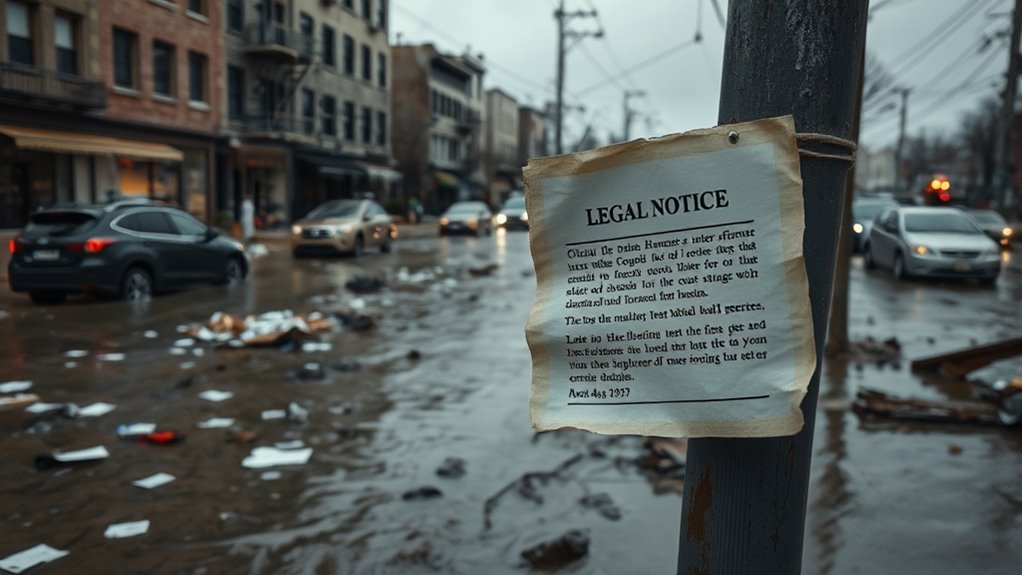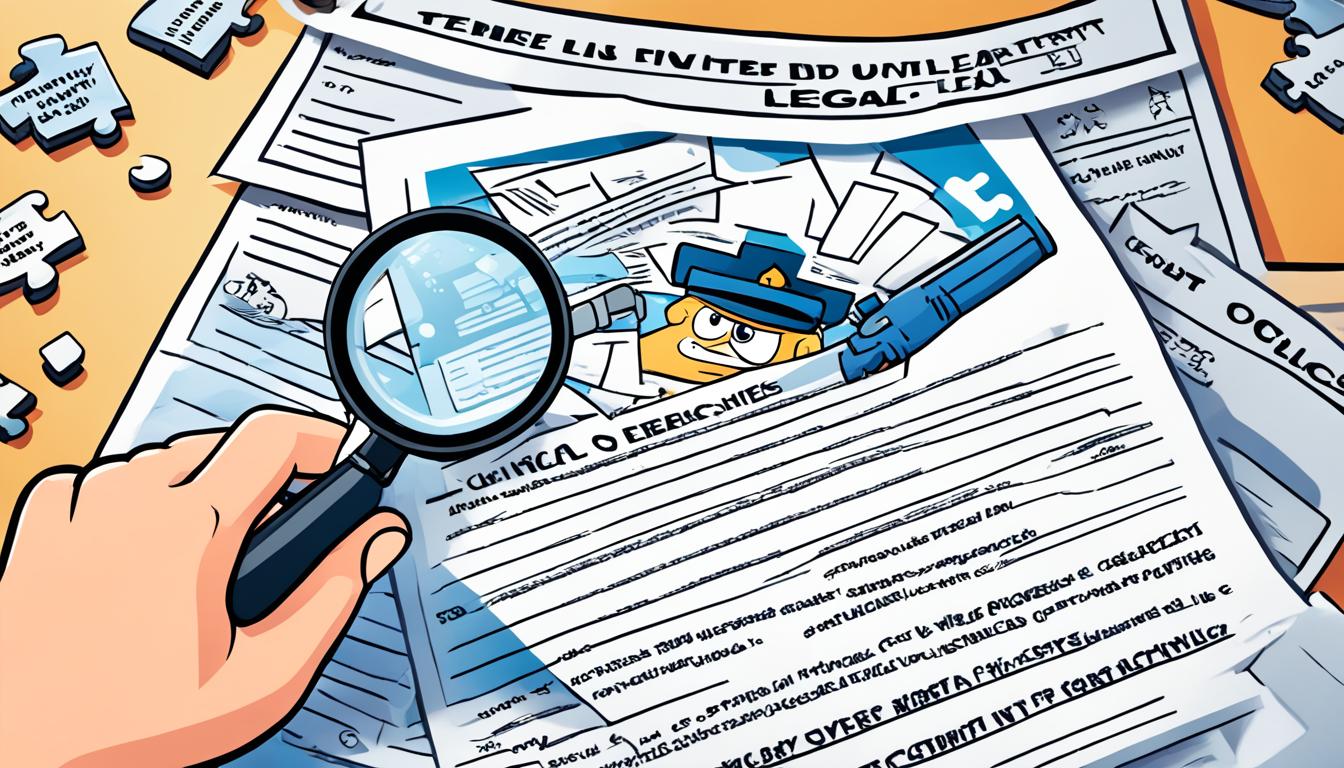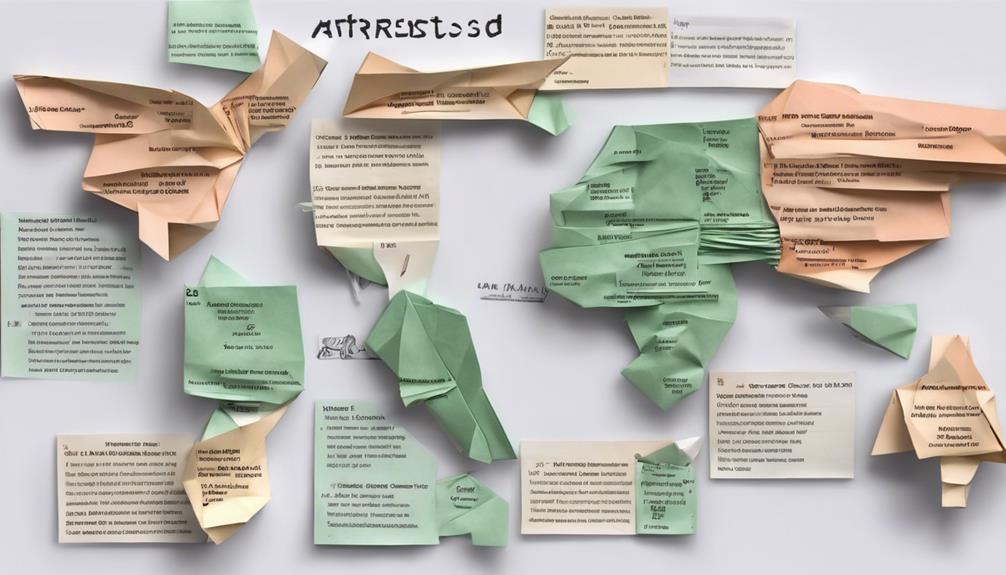After a natural disaster, court operations get disrupted, making it harder for you to attend scheduled hearings. Displacement, damaged infrastructure, and urgent personal issues can prevent you from staying informed or appearing in court on time. As a result, warrants are often issued for missed appearances, which can lead to arrests or legal complications. Staying aware and connected helps you avoid these issues. Learn more about how disasters impact court processes and your legal standing.
Key Takeaways
- Disasters disrupt court operations and communication, leading to increased missed court appearances.
- Displacement and infrastructure damage hinder individuals’ access to court notices and remote hearings.
- Courts often issue warrants for missed dates to ensure legal processes continue post-disaster.
- Lack of awareness about remote hearing options causes more missed appearances and warrant issuance.
- Law enforcement prioritizes urgent cases, but warrants for missed court dates still rise after disasters.

Natural disasters often leave communities in chaos, but they can also trigger complex legal and financial responses, such as the issuance of warrants. When disaster strikes, the immediate focus is on rescue and recovery, but the aftermath can lead to overlooked legal obligations. One common consequence is an increase in missed court dates, which often results in more warrants being issued. Understanding why this happens requires examining how disaster recovery efforts can interfere with legal processes and the legal implications of missed court appearances.
During a disaster, your priority shifts to safety and rebuilding. Emergency services and government agencies concentrate on providing aid, restoring infrastructure, and helping residents recover. In this chaos, attending court dates can fall by the wayside, especially if you’re displaced or dealing with urgent personal issues. Courts may not have the resources or the ability to notify individuals about upcoming hearings, leading to unintentional missed appearances. As a result, law enforcement agencies issue warrants not just for non-compliance but also to ensure court proceedings can continue smoothly once the disaster subsides.
During disasters, safety takes priority, often causing missed court dates and warrants to ensure court proceedings continue smoothly afterward.
The legal implications of missed court dates during disaster recovery are significant. When you miss a scheduled court appearance, a warrant may be issued for your arrest, which complicates your situation further. These warrants are often called “failure to appear” warrants and can lead to arrest, fines, or additional charges. During natural disasters, courts may also be more lenient or, conversely, more strict, depending on the circumstances. Still, the underlying issue remains: missed court dates can escalate legal troubles and create hurdles for your recovery process.
In some cases, courts recognize the extraordinary circumstances caused by disasters and may issue notices or hold hearings remotely. However, if you’re unaware of these options or unable to access them due to displacement or infrastructure damage, you risk missing essential dates. This can lead to warrants that complicate your disaster recovery efforts, especially if you’re trying to return to normal life. Law enforcement officers, overwhelmed by the situation, may prioritize urgent cases, but warrants for missed court appearances still pose risks—delays, arrests, and legal penalties—further complicating your path to rebuilding.
Furthermore, understanding the importance of legal communication and staying informed can significantly reduce the risk of warrant issuance during disasters. Ultimately, natural disasters disrupt more than just physical spaces—they impact your legal standing as well. Being aware of the potential for warrants after such events underscores the importance of staying informed and maintaining communication with your legal representatives or court officials. Recognizing the legal implications of missed court dates during disaster recovery can help you better navigate the complexities and avoid additional setbacks in your journey toward rebuilding your life.
Frequently Asked Questions
How Can I Find Out if I Have an Outstanding Warrant?
To find out if you have an outstanding warrant, start with court records in your area. Many jurisdictions offer online warrant searches, where you can enter your name to check for any warrants. If online options aren’t available, visit or call the local courthouse directly. Doing a warrant search helps you stay informed and address any issues promptly, preventing surprises or legal complications later on.
What Steps Should I Take if I Missed a Court Date?
If you missed a court date, act quickly to protect your legal rights and navigate warrant procedures. You should contact the court promptly, check for any existing warrants, and consider consulting a legal professional. Attend any scheduled hearings, or seek a new court date if necessary. Taking responsibility and staying proactive helps resolve issues faster. Remember, your prompt action can prevent additional penalties or arrest, keeping your legal matters on track.
Are Warrants Automatically Cleared After a Natural Disaster?
You might wonder if warrants are automatically resolved after a natural disaster. Typically, disaster recovery efforts don’t include warrant clearance, so your warrant may still be active. It’s important to proactively address this by contacting the court or seeking legal help to resolve the issue. Don’t wait for automatic warrant clearance; taking action ensures you avoid further legal complications during disaster recovery periods.
Can I Resolve a Warrant Remotely During a Disaster?
Like a lighthouse guiding ships in a storm, remote resolution offers a beacon during disasters. You can often resolve a warrant remotely by following disaster procedures, which may include online court portals or phone consultations. Check with local authorities or your legal advisor to confirm specific steps. During a disaster, these options help you navigate the turbulent waters of legal obligations without risking missed court dates or additional penalties.
What Legal Help Is Available for Those With Warrants Post-Disaster?
If you’re facing disaster-related warrants, emergency legal aid can provide vital assistance. You can access legal services that specialize in helping individuals manage warrants caused by missed court dates during natural disasters. These resources often include remote consultations and legal advice to help you navigate your situation safely and efficiently. Don’t wait—reach out to local legal aid organizations or disaster response programs to get the support you need during this challenging time.
Conclusion
Think of a natural disaster as a storm sweeping through your town, disrupting everything in its path. Missed court dates are like fallen leaves scattered in the wind—easily overlooked amid chaos. When the skies clear, those leaves settle into hidden corners, unnoticed until the law’s watchful eye spots them. Just as storms leave behind debris, natural disasters leave behind missed obligations, turning quiet streets into a maze of missed warrants waiting to be uncovered once order is restored.









